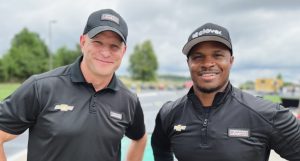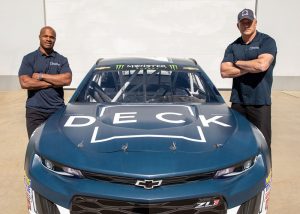From Zero To 8.5 Seconds

From left: Shaun Peet and Mike Metcalf of DECK Leadership
By Mark MacDonald
NANAIMO – Call him the Hero of the Zero.
Nanaimo native Shaun Peet, an in-demand motivational speaker in the United States through the DECK Leadership company he co-owns with Mike Metcalf, often starts his presentation talking about a bunch of zeros.
Zero players of the game.
Zero first stars.
Zero Western Hockey League invitations.
“It was just zeroes, and I was the worst player on every hockey team I played on until midget,” Peet recalls. “Then the work ethic caught up. When I made the (B.C. Hockey League‘s Nanaimo) Clippers. I never thought I’d make them in a million years. It was a mindset thing. I realized in life that it is not what you are able to do but rather what you are willing to do. A relentless work ethic got me here.
“My parents met bowling, so it certainly wasn’t genetics.”
Peet’s penchant for hard work is legendary. One of the reasons he ended up playing for the Clippers was when an oil truck driver saw Peet riding his bike on the Island Highway with his hockey gear on his back, pedaling the 30 kilometre trip from Nanaimo to Parksville, where ice time was only $2 per hour.

Mike Metcalf, left, and Shaun Peet
After earning a scholarship and graduating from Dartmouth College in New Hampshire, Peet played seven years of minor professional hockey before shifting to NASCAR, almost by chance. While serving an 18-game suspension for fighting in 2002, Peet was asked by a friend if he could jack up a car, and he cranked it up so swiftly that Bill Davis Racing hired him for their pit crew.
He moved up to become the Pit Crew Coach for Chip Ganassi Racing and after six years there, the team was purchased five years ago by Trackhouse Racing, which is under the Red Bull banner, and Peet continued as co-head Pit Crew coach with Metcalf.
They co-wrote a book titled 12 Second Culture, which is the basis of their presentations to corporations across North America. They often use a race car and accompany pit crew tools to provide hands-on demonstrations about how teamwork utilized by their NASCAR pit crew translates seamlessly into organizations and corporate cultures.
12 seconds? That’s old news now, as Peet explains that since NASCAR tires have four lug-nuts instead of five, their time to replace four tires, re-fuel and tear away the top layer of an acrylic windshield is down to 8.5 seconds.
“Speed is the new currency of business, and to build a high performing team, it starts with valuing people,” he states.
Their NASCAR pit crew team is filled with insanely strong and hardworking former U.S. Navy Seals, and college and former professional football players. Metcalf is a former Appalachian State University football player.
One of their key crew members tells of how he wanted a pool in their yard while growing up. Their father, a Serbian immigrant, brought three shovels home from work, and the kids dug the pool out by hand.
“We look for world class human beings, and we have people out there looking for us,” he says. “On our team, we don’t do entitled, we don’t do selfish, and we don’t do lazy. If you are that, you’re going to be out pretty quick.”
Besides the emphasis on Zeros, Peet shares one of his worst experiences in sports as prime motivation for becoming a success. Peet was unceremoniously cut from an East Coast Hockey League’s Hampton Admirals by the infamous John Brophy, a hard-nosed career minor leaguer who coached the National Hockey League’s Toronto Maple Leafs in the 1980’s – think Don Cherry without kindness.
One of his presentations, One Good Shift, is about his journey from hockey to NASCAR, and he admits his encounter with Brophy was a life changer.
“All of us are one decision away from a completely different life,” notes Peet, who now lives in Davidson, North Carolina with his wife Jane, who is from Port Alberni. “When I was demoted in pro hockey, NASCAR was the result. I was coming home to help coach the Clippers, and NASCAR came up by accident. This became the route, not the other one.
“What people don’t realize is the magic lies in the things we’re avoiding and that everything great lies on the other side of hard,” he adds. “When we think something is hard, the most important question in the world becomes is compared to what? With that in mind, I never ask myself if something is hard or not. I ask myself, Is it worth it?”
Peet comes from that honestly as his parents, Bill and Sandra Peet, are well known Nanaimo small business owners. Bill raced a 1967 Cougar with a stuffed Tasmanian devil zip tied to the roll cage around the Grandview Bowl, when it was Nanaimo’s stock car racing track in the early 1970’s and early 1980’s. It is now Merle Logan Field at Beban Park.
“Everything I’ve got that is great in my life that I feel has value came from blood, sweat and tears. Everything I’ve truly coveted has been hard-earned,” he states. “That’s the message I want to get out there to kids, is that it’s there for you. Go get it. Are you willing to put your phone down? Are you willing to go through high school without a girlfriend? What are you willing to do? Everybody says they want to win, but what are they prepared to do to get there?”
Peet says DECK (Diversity, Efficiency, Culture and Kindness) has done about 50 corporate presentations this year, including to Jockey, and Citadel Equities (a $40 billion Wall Street company), and Kubota.
“I spoke after (Yellowstone creator) Taylor Sheridan at a Kubota convention, to 8,000 farmers,” he states. “Now Kubota sends me to their dealerships across the country. I will literally bring the race cars, put the guns and tires and fuel cans in their employees hands, and show them how it’s done.”
They charge between $60,000 and $85,000 for that level of presentation, and $12,000 for a speech without the vehicles. Deck will make a presentation in Toronto next year, and there have been discussions about one in Vancouver as well.
“I am 48 years old and I don’t feel I’ve worked a day in my life,” he recalls. “In university I made a conscious decision to chase joy. I saw some of the richest kids in the country there, who had all the things I was supposed to want, and they were miserable. It let me peek behind the curtain and I could see that money wasn’t the answer.
“Rather than go to Wall Street, I went to play hockey in the Texas League for $300 a week, and when I was through with hockey I went to NASCAR. I was going to do it until it was no longer fun, and that was 20 years ago.”


